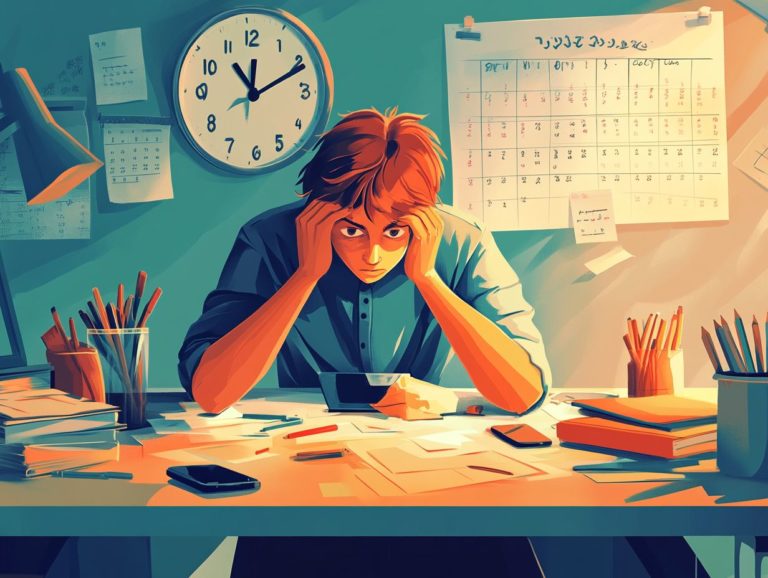Identifying Triggers that Cause Procrastination
Procrastination is a universal challenge that can derail your daily routine and obstruct your aspirations. Grasping its psychological underpinnings is your initial step toward addressing this issue effectively.
This exploration delves into the myriad triggers that ignite procrastination, the repercussions it has on your productivity and well-being, and the potent strategies to liberate yourself from this cycle.
By identifying your unique triggers, formulating actionable plans, and recognizing when it s time to seek professional guidance, you can regain mastery over your time and elevate your productivity to new heights.
Contents
- Key Takeaways:
- The Psychology of Procrastination
- Common Triggers for Procrastination
- Impact of Procrastination on Daily Life
- Overcoming Procrastination
- Creating an Action Plan
- Seeking Professional Help
- Frequently Asked Questions
- What are common triggers that cause procrastination?
- How do I identify my personal triggers for procrastination?
- Can procrastination be caused by external factors?
- What can I do to avoid procrastination triggers?
- How can I overcome procrastination once I have identified my triggers?
- Is it possible to completely eliminate procrastination triggers?
Key Takeaways:

- Identify your personal triggers for procrastination to address the root cause.
- Procrastination can negatively affect daily life, increasing stress and causing missed opportunities.
- Develop an action plan, and seek professional help if necessary, to overcome procrastination and boost productivity.
The Psychology of Procrastination
Procrastination is a complex behavior rooted in emotional aversion, faulty thinking, and a range of external influences that can profoundly affect your ability to execute tasks efficiently.
Tim Pychyl from Carleton University highlights the importance of understanding the psychological mechanisms behind procrastination to pinpoint your procrastination triggers and craft effective productivity systems.
This tendency often escalates stress and anxiety. The ambiguity and competing demands you encounter each day ultimately obstruct your path to achieving your goals and aligning with your personal values.
Uncovering What Holds You Back
Understanding the root causes of procrastination requires exploration of various emotional triggers, such as fear of failure and a lack of urgency. This phenomenon often arises when you place immense pressure on yourself to achieve perfection, leading to feelings of inadequacy and avoidance. To dive deeper into this topic, check out understanding the link between procrastination and motivation.
Consider a student who postpones starting an assignment due to anxiety about their performance, convinced that anything less than flawless is unacceptable. Without a compelling deadline, inertia sets in, making productivity a challenge as tasks become distant rather than immediate priorities.
These interconnected factors reveal that procrastination is not merely a matter of poor time management; it s a complex interplay of emotions and thoughts that ultimately affects your ability to complete essential tasks.
Common Triggers for Procrastination
Common triggers often stem from distractions, competing activities, and an emotional aversion to tasks that feel unstructured or ambiguous, which can be further understood by exploring the influence of environment on procrastination.
These factors can significantly complicate your ability to manage time effectively.
Identifying Personal Triggers
Identifying your personal triggers for procrastination means recognizing the specific tasks that set off avoidance behaviors and understanding emotional triggers for procrastination that follow.
To tackle this challenge, you can utilize several methods to boost your self-reflection and awareness. Keeping a journal can be especially beneficial, as it allows you to document your feelings and the circumstances surrounding instances of procrastination. By analyzing these entries over time, you can start to pinpoint patterns that reveal emotional responses linked to particular tasks.
Additionally, breaking larger projects into manageable tasks fosters a sense of accomplishment, helping alleviate the overwhelm that often accompanies bigger goals. This approach can lead to a more constructive mindset, enhancing your ability to regulate emotions and respond effectively to the tasks ahead.
Impact of Procrastination on Daily Life

The impact of procrastination on your daily life can be profound. It often leads to increased stress and anxiety, while simultaneously diminishing your productivity.
Ineffective systems and the challenges of completing tasks can create a cycle that feels almost impossible to break. Recognizing how procrastination affects you is crucial! It s your key to taking back control and boosting your overall well-being.
Consequences and Effects
The consequences of procrastination can weigh heavily on you, leading to emotional aversion. This cycle serves to heighten your stress and anxiety.
When you postpone tasks, you may find yourself grappling with too much to think about as unfinished work accumulates. This creates a chaotic mental environment that stifles your creativity.
The looming pressure of deadlines can exacerbate this situation, spiraling into a cycle of anxiety that makes each task feel even more intimidating.
To break this cycle, consider enlisting someone to keep you on track. Sharing your goals with someone else not only fosters motivation but also instills a sense of responsibility. This collaborative approach provides the necessary support to confront tasks directly, alleviating emotional aversion and ultimately enhancing your performance and productivity.
Overcoming Procrastination
To overcome procrastination, break tasks down into smaller parts! This allows you to tackle them one step at a time.
Harness rewards that come from within to keep yourself motivated, and employ various motivation techniques to cultivate a sense of accountability. This approach gives you the power to stay focused and make consistent progress.
Strategies for Breaking the Cycle
Implementing effective strategies to break the cycle of procrastination involves crafting a clear plan, utilizing tools like the Eisenhower Matrix, a tool to help you prioritize tasks, and applying techniques such as the Ten Minute Rule. These approaches not only boost your productivity but also cultivate a more organized mindset.
The Eisenhower Matrix gives you the power to prioritize tasks by categorizing them into four quadrants based on urgency and importance, allowing you to focus on what truly matters. The Ten Minute Rule works by committing you to work for just ten minutes; you may find that this small commitment often ignites greater motivation to keep going.
By integrating these methods into your routine, you can gradually develop habits that curb procrastination, leading to more consistent progress and heightened overall satisfaction.
Creating an Action Plan
Crafting an action plan is essential for executing tasks effectively, achieving your goals, and infusing a deeper sense of personal meaning into the work you undertake.
Developing Habits for Productivity

Developing productive habits is crucial for counteracting emotional triggers and reinforcing your commitment to tasks. This often necessitates changes in your environment and the implementation of accountability measures.
To successfully establish these habits, first identify the specific emotional triggers that derail your focus and motivation. This involves a bit of self-reflection to pinpoint those moments of procrastination or distraction.
By putting effective accountability systems in place like scheduling regular check-ins with peers or using productivity apps you can significantly boost your commitment to these new routines.
Cultivating a supportive environment and leveraging social interactions will help align your daily actions with your overarching goals, paving the way for a sustainable increase in your productivity and overall effectiveness.
Seeking Professional Help
Seeking professional help can be a pivotal move for anyone grappling with chronic procrastination. It opens the door to therapy, coaching expertise, and invaluable support from a peer coach, all designed to boost your accountability and propel you toward your goals.
Don t hesitate! Seeking professional help could be your game-changer in overcoming chronic procrastination.
When to Consider Therapy or Coaching
Recognizing the right moment to consider therapy or coaching is crucial for tackling those putting things off. Especially when other methods seem to fall flat.
You might find yourself ensnared in a cycle of avoidance. Struggling to break free from the patterns that hinder your progress toward your goals is common.
If you often notice that important tasks are consistently postponed or feel overwhelmed by your responsibilities, it could be a sign of a problem that needs attention that deserves professional help.
Indicators such as a noticeable dip in productivity and a persistent sense of guilt often highlight a lack of accountability. This complicates your ability to commit to change.
Seeking guidance from a therapist can help illuminate these behaviors. It can also help you cultivate healthier habits and reignite that spark of motivation you ve been missing. Don t wait! Reach out for help today!
Frequently Asked Questions
What are common triggers that cause procrastination?
Common triggers that cause procrastination include fear of failure, lack of motivation, feeling overwhelmed, perfectionism, and distractions. To address these issues, it’s important to explore understanding the psychological barriers to overcoming procrastination.
How do I identify my personal triggers for procrastination?

To identify your personal triggers for procrastination, reflect on past instances of putting things off and observe patterns in your behavior. Keeping a journal can also help you track your thoughts and emotions when you find yourself procrastinating.
Can procrastination be caused by external factors?
Yes, external factors such as a chaotic environment, excessive workload, or lack of resources can also act as triggers for procrastination.
What can I do to avoid procrastination triggers?
Create a game plan to tackle your tasks! Break down large tasks into smaller ones, eliminate distractions, and address any underlying fears or anxieties that may be contributing to your procrastination.
How can I overcome procrastination once I have identified my triggers?
Once you have identified your triggers for procrastination, work on developing strategies to manage them. This may include setting specific goals, creating a supportive environment, seeking accountability, and practicing self-discipline.
Is it possible to completely eliminate procrastination triggers?
While it may not be possible to completely eliminate procrastination triggers, you can learn how to manage them effectively. Understanding your triggers and developing strategies to cope with them can reduce their impact on your productivity and overall well-being.
Summary: To tackle procrastination, identify your triggers, create a game plan, and seek support. Remember, change is possible!






